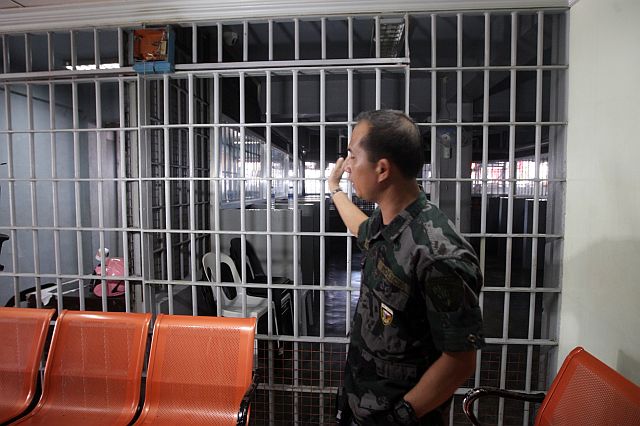
SENIOR Insp. Zosimo Jabas, head of the police team now securing the Cebu Provincial Detention and Rehabilitation Center (CPDRC), shows the visiting area where visitors can no longer have any physical contact with the prisoners (CDN PHOTO/TONEE DESPOJO).
Those who will be visiting male relatives jailed at the Cebu Provincial Detention and Rehabilitation Center (CPDRC) can no longer touch, much less hug, their imprisoned loved ones, unless one is the spouse.
The Cebu provincial government has decided to lift the suspension of the family visitation privilege for male prisoners at the CPDRC starting Monday, but it will also implement at the same time a “no physical contact” policy between the inmate and his visitor, except if the visitor is the wife.
Unlike before when visitors could enter the quadrangle inside the jail facility, the visitors will now be limited to the visitors’ area, where the cubicles are set up and they can only talk through glass partitions, said CPDRC assistant jail warden Bobby Legaspi.
Gov. Hilario Davide III earlier announced that in order to monitor visitors, the provincial government decided to cluster visitations according to the the inmates’ cell.
“We (have) 13 cubicles (in the) visitation room (which is) divided by glass so the inmates will be outside and the visitors will be inside the room,” Legaspi said.
The inmates will only have 30 minutes to talk to their visitors. Visitation will start at 8 a.m. and will end at 4 p.m. from Mondays to Fridays.
According to Legaspi, a married inmate will be allowed to stay in a conjugal room with his wife during the 30-minute visitation period but only if the visitor can present a marriage certificate. He said Davide approved the construction of 19 conjugal rooms.
“The conjugal rooms were approved by the governor already that’s the reason why we also did the ocular inspection (on Thursday because) we wanted to view the conjugal rooms. On the conjugal room, they can only stay for 30 minutes (but) they have to show (first) a marriage certificate. If it’s a girlfriend they cannot (use the conjugal room),” Legaspi said.
On Thursday, inmates voluntarily turned over 184 cell phones to Legaspi in order to regain their visitation privilege, which was suspended after some 50 cellphones and gadgets were earlier confiscated in a surprise inspection by police elements from the Provincial Public Safety Company (PPSC).
A 20-man PPSC team was sent to guard the jail after Davide received reports of a plot to spring out of jail confessed drug lord Alvaro “Barok” Alvaro and the continued entry of contraband despite the Aug. 13 raid where cellphones and other prohibited items were seized.
However, just like in the previous raid, jail authorities did not find any illegal drug or drug paraphernalia during the inspection.
PPSC team leader Senior Insp. Zosimo Jabas Jr. said the surprise inspection was part of their continuous monitoring of the jail facility.
According to Jabas, the policemen under PPSC are strictly implementing the order of Davide to tighten security at the province-owned jail facility and to ensure that no contraband can get inside.
“Naa man tay gibuhat nga guidelines sa mga visitors nga mosulod diri (We have formulated the guidelines for visitors). We will not allow visitors to bring cellphones with them inside. Ibilin na sa gawas (They have to leave it outside). They will undergo thorough checks… to make sure nga wala silay dala sa sulod (that they cannot bring any banned item inside),” Jabas said.
Asked if the Operation Greyhound last Aug. 13 could be considered as unsuccessful considering that there were still banned gadgets inside the facility after the raid, Legaspi said he still believed it was successful.
“I believe it was good. It’s just that they have good hiding place. The main reason why they still have those gadgets is that they want to have a contact with their family from the outside,” Legaspi said.
Legaspi said the seized cellphones and other items would be destroyed. But the SIM cards and phone memories would be examined first to find out if the phones were used for illegal activities, such in engaging in the illicit drug trade.
Legaspi said they also inspected the isolation rooms, including the one occupied by Barok, but they found nothing from him.
Even if so much prohibited items have been turned over or confiscated, Legaspi and Jabas still believed there were still more contraband hidden inside the jail facility, since some of the cellphones, for example, had no SIM cards in them.
Legaspi said that if they will find a contraband in their next surprise inspection, the guilty prisoner will not be the only one who will lose his visitation privilege but his cell mates as well. There are 20 inmates per cell at the jail.

